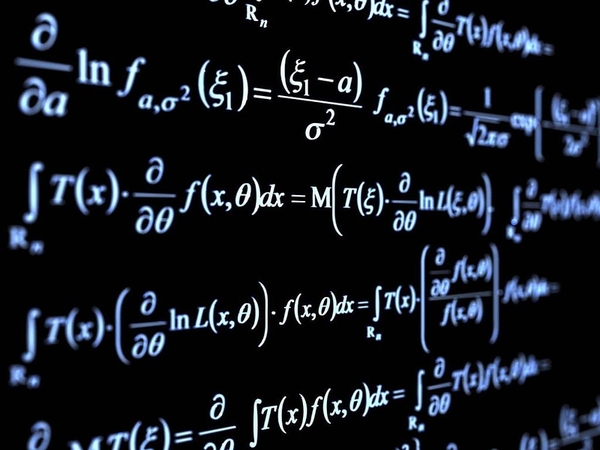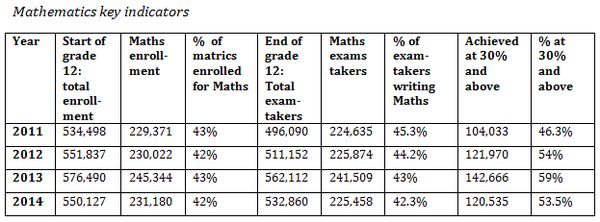“Why we don’t do maths” - high school students explain

At the end of grade nine South African students are expected to decide which subjects they would like to continue with for the rest of high school. One of the important decisions they make is whether or not they will continue with maths, or take maths literacy. As five students explain, the decision is tough, affects their future, and is not always made freely and based on their true ability and interests.
In June this year, the Department of Basic Education revealed in parliament that 75.7% of public ordinary schools in South Africa offer maths from grade ten to 12. Although most students in South Africa have the option of doing maths after grade nine, this varies markedly across provinces. In Gauteng, this percentage is at almost 90% of schools, while in Mpumalanga only 44% of schools offer maths. (Note: when referring to maths, we do not mean maths literacy.)
According to the department, “non-availability of qualified, competent teachers of FET Phase Mathematics,” is one of the reasons some schools do not offer the subject. Even if public schools do offer maths, however, by grade 12 most students across the country are not enrolled in maths and do not write a maths final exam (see table below).
 From Equal Education, 2015. “On the 2014 Matric results”.
From Equal Education, 2015. “On the 2014 Matric results”.
In 2014, of students who wrote the maths matric exam, only 53.5% achieved above 30 percent. The trouble, however, seems to start before matric. Statistics from 2012 Annual National Assessments (although highly contested as a form of testing) showed that grade nines across the country were struggling with maths – the majority scored below 30%.
 Distribution of results in 2012’s Annual National Assessments for grade nine maths. The authors warn, “There are issues around the reliability of these
tests.” Source: Simkins in CDE 2013.
Distribution of results in 2012’s Annual National Assessments for grade nine maths. The authors warn, “There are issues around the reliability of these
tests.” Source: Simkins in CDE 2013.
Boitshepo Phafoli is 16 years old and in grade 11 at a public secondary school in Kaalfontein. In grade nine he was struggling with maths, achieving grades below 40%. “I needed someone to be there to help me.” Instead he felt his teacher was not taking time to make sure he and others in the class understood the concepts. There were also no extra classes available at his school.
He was not the only one struggling. He recalls that very few of his classmates passed maths at the end of grade nine. “Almost the whole class wanted to do sciences in grade ten.” Instead, because they failed maths, the students were required by the school to drop maths and were ineligible for science subjects.
For Boitshepo, his problems with maths in grade nine cut short his hopes of studying medicine. With mathematical literacy, and without science, he had to rethink his career path. Although he has new aspirations, and is succeeding at maths literacy, he says of stopping maths, “I’m still regretting it”.
Natalia (name changed) is also in grade 11 doing mathematical literacy at a neighbouring public school in Ivory Park. Despite excelling at maths in primary school, in grade nine, Natalia had trouble understanding, and did not relate to the teaching. Not doing as well as she would have liked, she decided to stop doing the subject and opt for mathematical literacy. At her school only students who take maths can choose to do science. “I wanted to do science, but I couldn’t do maths literacy [with it], so I chose to do geography, history and tourism”. “It was hard because most of my friends chose to do pure maths. I made the decision on my own”. For Natalia, dropping maths meant losing science, her favourite subject. Like Boitshepo, she relies on science textbooks and friends to continue learning. Looking back on her experience with maths at her school, Natalia says, “They should give us, as individuals, attention.’’
Unlike Natalia, Ayanda (name changed), in grade ten at the same school, decided to do maths. Like the other students interviewed, Ayanda, found maths easy in primary school but challenging in high school. Her grade eight teacher “didn’t go back to the basics”, but rather assumed that learners were at a certain level.
“The teacher didn’t help us understand, he just gave us work, marked, and returned our marks.” Ayanda was battling. Thankfully, in grade nine, she ended up with a teacher “who made us understand and gave us a lot of examples”. With her improved marks and after researching career prospects, she chose to do maths.
However, the majority of students in her grade have chosen to do mathematical literacy. Although she is one of the better performers in her maths class, she thinks that many learners are not managing. She attends tutoring sessions in Ebony Park run by IkamvaYouth, a national educational nonprofit. In her view, getting through maths “…depends on you, what you do when you get home”.
By the end of this year, 15-year-old Zoe (name changed) will have to make her subject choices, and her choice on maths. In her school she can choose to take maths irrespective of her grade nine marks, and can decide on her own combination of other subjects.
But this year hasn’t been an easy one. Discipline issues in her grade nine class at a high school in Midrand has seen them change maths teachers several times. Sometimes they didn’t have a teacher. The changes and environment were difficult for Zoe, ”Other learners make it hard for [those] learners who want to learn and focus.”
She started private extra lessons and attended tutoring sessions at IkamvaYouth. She is passing maths again, and is adamant that she will take it forward. “I have to take maths because of my career”. There are also added social pressures, “If you take maths literacy, most of your friends will laugh at you, saying you’re stupid.”
Shelton Chadya’s story shares elements of the stories of Zoe, Ayanda, Natalia and Boitshepo. He went to high school in Ivory Park. He didn’t have a stable maths teacher. He sought extra lessons from IkamvaYouth in Ebony Park. And one day in high school, he says, “I decided that I should quit maths.”
Shelton is a BCom Accounting graduate from the University of Johannesburg, and now works for Olico Youth, where he provides maths support to township school youth. Shelton didn’t end up quitting maths in high school, but it took a great deal of effort. He sought help from his uncle’s friends, taught himself maths in grade ten and grade 11, and attended tutoring sessions at IkamvaYouth.
Although he was on the brink of quitting, he says, “I always wanted to make sense of maths”. What was clear to Shelton was that he had to be motivated, and look for help outside of the walls of his school. “Most of my classmates accepted the fact that maths is difficult”. Shelton says that something is fundamentally wrong with the way maths is taught in South African schools. Instead of focusing on matric results, he believes we need to look at how maths is taught in the lower grades. Students struggle with understanding basic concepts, and this accumulates. Often, he says, teachers do not identify the students who don’t understand. Perhaps most importantly, Shelton believes we need to stop the emphasis on results and marks when teaching maths, “[you] need to do a subject to understand, to apply skills.”
Not understanding maths in grade nine, and without available opportunities to begin to understand, Boitshepo and Natalia chose to stop doing maths. But is it really a choice that they made?
Due to an editing error, this article was originally published with the incorrect table from the Equal Education website. This has been corrected.
Next: Horses graze at Freedom Park
Previous: Will gold miners get justice?

This article is licensed under a Creative Commons Attribution-NoDerivatives 4.0 International License.


